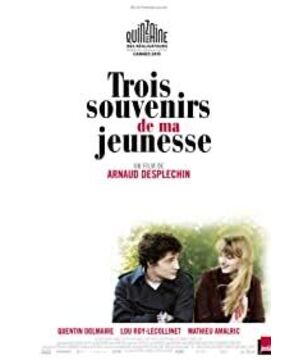Author: Fang Hanjun
Arnold Deripschin's "Three Memories of Youth" (2015) was famous for a while, but then seemed to disappear.
The anthropologist Paul Dallas, played by Matthew Amalric, is also a hard worker, and there is no process throughout, because the process must be left to "his" youth. From pieces to completeness, and then from completeness to fragmentation, endless chatter, and even the chattering love behind, repeated, always unable to keep fresh, turning around and changing face, unhappy, it will turn the world upside down, not so much a youthful Heat and agitation, it is better to say that the romantic characteristics of the French wind burst.
The so-called three memories of youth vary in length and are not evenly distributed. The first paragraph, the mother of three siblings, committed suicide when Paul was 11 years old, is the shortest. As a result, the three brothers and sisters became more intimate with their grandmother, and they all told their grandmother in private. As a salesman's father, he lived a silent life as if he was self-detained, and he did not continue. The shadows of childhood follow him, which will affect Paul's attitude towards girls later, which is not only hesitant, alienated, but also Oedipal attachment and unease.
In the second paragraph, Paul, who returned to China, finally confided his inner secret to the officials. In 1987, he and his classmate Mark went to Minsk in the Soviet Union for a study tour. Because Mark was Jewish and cooperated with Israeli agents, he needed to rescue a local Jewish scholar. Paul volunteered to let them replace his passport status, and asked Mark to "fist him". Adding up,” lied to the Soviet police that they had been attacked by gangsters in the museum, and that all passports and money were robbed, helping the Jews to escape to Israel.
The tone of this film is cold, the rhythm is tense, unexpected and suspenseful, and it is also scary enough. The Jew who took his place later lived in Melbourne, and of course died there. This ignorant political adventure is just the mischief of youth hormones, not Paul’s substantive political ideas, or simply to join in the fun. Anyway, young people have the capital to toss, and fortunately, they were not caught by the Soviet KGB. Over a catastrophe.
And love is the real master of the film. If the first two paragraphs are just warm-up preparations, then the last paragraph of Paul and Esther's clutching and reunion is the chapter with the most "new wave" characteristics in the film. The director claims to be an admirer of Truffaut, from which we can see the shadow of "Zu and Zhan", at least to pay tribute. Love is fun, but it also hurts. The love in the film is more like an endless narrative rather than a simple progression. Remembering the lost youth is all about love. The essence of youth is the agitation of restlessness.
19-year-old Paul met 16-year-old Esther and fell in love. At this time, Paul suffered from sudden depression and was hospitalized for three months. After coming out, she fell in love with the bright and refreshing Esther, but Esther was fragile and changeable. Paul went to university in Paris and studied anthropology with Beonzan, a famous black female professor in Benin.
In those few years, the love and waiting of the two could only convey swollen thoughts through words, and the exciting relationship that met like a flash flood would always linger and be lost, even hysterical and angry after passing away in a hurry. Esther and her friend asked Pierre to see Paul off, and the train was gone. In addition to being sad, she had to snuggle in Pierre's arms, just like this.
Esther went to the local university after the college entrance examination. They took the train to Paris together to watch the art exhibition. Paul explained the love in the painting to her. Paul, who was still a doctoral student until later, had to go to Dushanbe, Tajikistan because of his passion for research. At this time, Esther couldn't bear the loneliness, and proposed to break up, and later disappeared from Paul's vision and letters. .
At the end, the emotional explosion of the protagonist's savings gathered, and it felt logical. After returning to Paris, Paul was alone and unexpectedly saw Jean Pierrot, his wife and old friends meeting and going to the coffee shop to chat. Seeing Pierre so happy now, Paul finally became hysterical, accusing Pierre of stealing his Esther, berating him for being irresponsible, and roaring "You all stole my Esther!". It seems that he is talking about others, and it must be a kind of self-blame and guilt for this distant love.
Of course, this scene made the other party embarrassed, after all, his wife was by his side.
In fact, Esther, who is unable to control herself, is arrogant and fearful, as she herself said, "You know I love you, but you are out of reach". This is the root cause of their inability to end their love. Esther couldn't stand the separation of even a little time, a girl who was particularly prone to screaming and fear of being alone, and couldn't blame others.
In a word, once Esther returns to loneliness, there is no way to solve it. Loneliness, to her, was like an upside-down sharp blade, which made her thorn in her back and could not find a place to stay. She had to find someone to hang out with, although that was not love, because she did love Paul.
Paul, who is also vulnerable, can only look for external causes, not from his own weaknesses. He has also wandered on the way, such as the tidal wave of love with Gilbert, who is a few years older than him. It was fast, but Esther didn't know it. His younger siblings didn't like Esther. When they were just in love, Esther's ex-boyfriend brought a few guys to take revenge, and they beat Paul with bruises and bruises.
Esther couldn't fit in with Paul's family. Paul's sister also has low self-esteem and told her father if I am ugly, why no boys are looking for me. The younger brother was almost deceived by the Arabs and bought a pistol out of nowhere, but Paul returned it after discovering it. This special family relationship constitutes the mixed nature of the youth in France in the 1980s, and it is also a ghost of their youth. The streets of Paris or France are full of Arabs, and the origin and continuation of existence are found in this film.
Later, Paul went to worship in front of his grandmother's grave, turned around and saw the old woman talking to him, and the father in front was worshipping Paul's mother at the same time. In the third paragraph of the film, the lovers sometimes pour out their hearts to the camera. This direct use is bold enough to think, and it does run the risk of being criticized. Later, the "Caesar Award" was nominated for more than ten items, but no success was achieved. Whether it is directly related to this is not necessarily, but this Godard-style mirror language has no new meaning, but has become a superfluous.
Look into Paul's eyes to see the empty echoes of the film. When he lost his temper with Pierre, the wind was blowing, and when he walked to the bridge, there were postcards flying in the sky. It was the letterhead of his correspondence with Esther in those years, and it was also the splendid time of their love. But it is lost in the wind and will not return. The identity of an anthropologist is only a veneer, even a mockery. Paul is not only alone at the moment, but also weak. He can only rely on fantasy to susten the ethereal emotions.
People, once they get rid of their external identity, they are restored to a person of true origin. They are like orphans. Home-like talk about a romantic love that can easily melt into water vapor. What melts is their past youth, which is sentimental, wandering and chilling. Looking back again, there is nowhere to go, and everything is like a dream that has disappeared like smoke.
2016、9、26
View more about My Golden Days reviews











